In a bold step to transform Early Childhood Development (ECD) outcomes, the Government of Meghalaya formally launched the Centre for Developing Child (CDC), a pioneering initiative under the Meghalaya ECD Mission Society.
The CDC is envisioned as a first-of-its-kind research-to-practice platform, designed to bridge gaps between policy, evidence, and frontline realities. To kickstart this movement, a high-level national workshop was convened in Shillong, bringing together a powerful coalition of policymakers, developmental paediatricians, researchers, frontline practitioners, and institutional partners to co-create solutions that are context-sensitive, scalable, and driven by community ownership.
Participants from Maharashtra, Odisha, and Karnataka also joined the deliberations, reflecting a growing national momentum to reimagine how India nurtures its youngest citizens—not through fragmented programmes, but through integrated, people-centered systems.
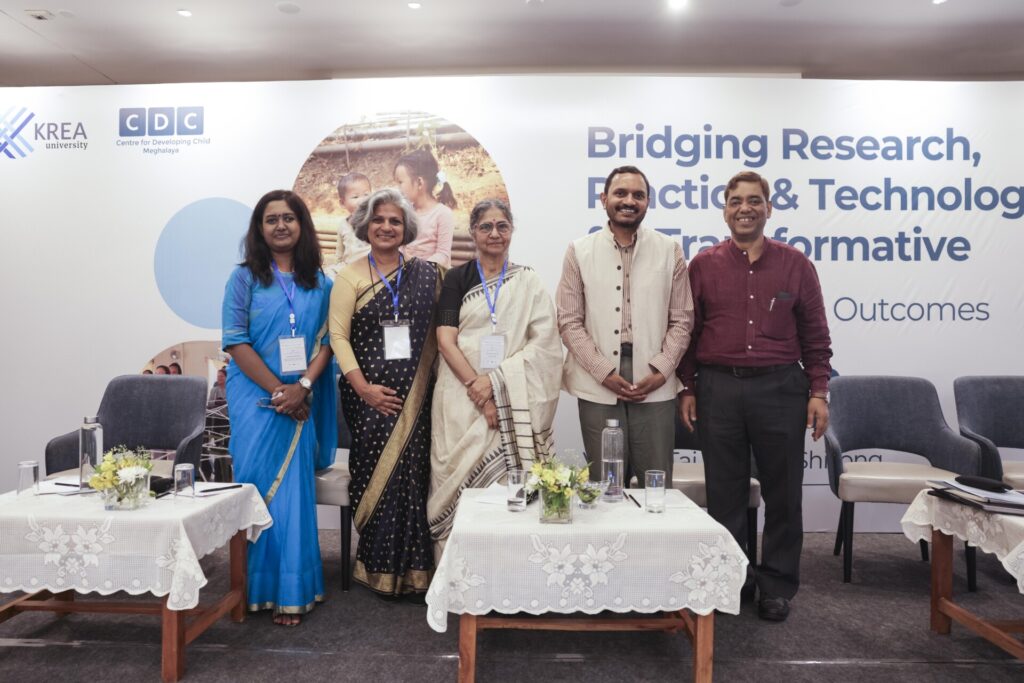
A Multi-Sectoral Mission for Meghalaya
Addressing the gathering, Mr. Sampath Kumar, IAS, Development Commissioner & Principal Secretary, Government of Meghalaya, emphasized that ECD is not the mandate of a single department but a multi-sectoral mission. “Convergence across departments, communities, and frontline systems is essential to create nurturing ecosystems for children. Our CDC is envisioned as a governance-research platform that will anchor this convergence,” he remarked.
Mr. Ronald Kynta, Chief Operating Officer of MECDM, announced that the Asian Development Bank (ADB) has allocated USD 2.5 million to operationalize CDC Meghalaya over the next two years, reinforcing the state’s commitment to transforming ECD outcomes.
Insights from the Panel: From Awareness to Action
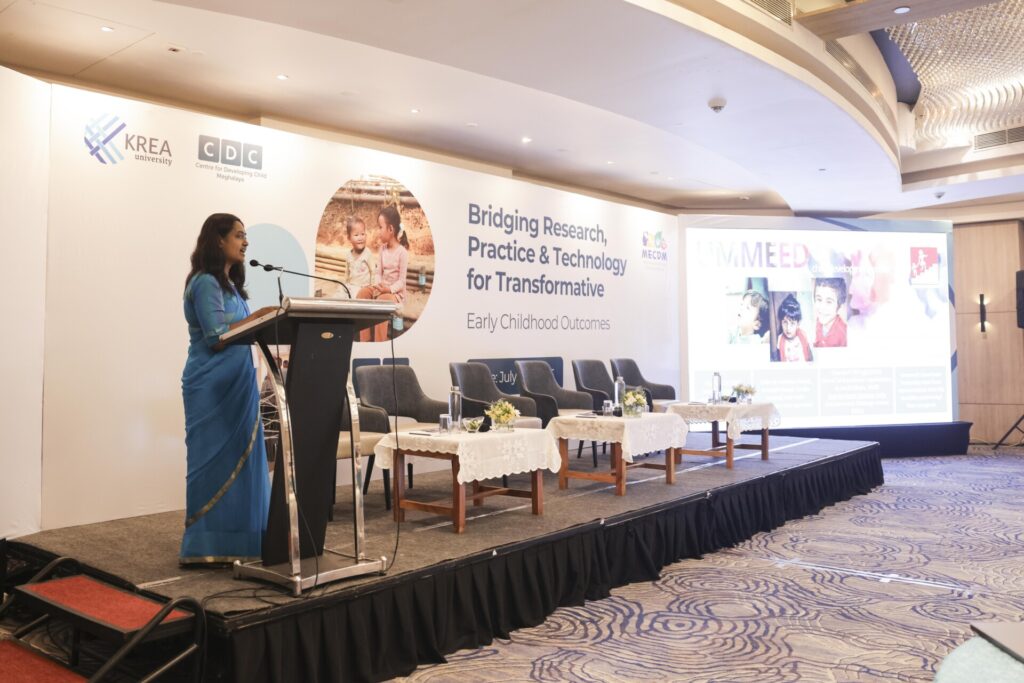
The first panel, moderated by Dr. Roopa Srinivasan, Senior Developmental Paediatrician, Ummeed Child Development Centre, focused on building inclusive foundations for young children with disabilities and delays. Key speakers like Dr. Subodh Gupta (MGIMS), Dr. Sunanda Reddy (CareNidhi), Dr. Simin Irani (UNICEF Maharashtra), and Dr. Sandra Albert (IIPH Shillong) emphasized home-based interventions, positive parenting, Kangaroo Mother Care (KMC), grassroots capacity building, and community-driven models. Dr. Srinivasan highlighted a powerful case of a non-verbal child finding his voice through Augmentative and Alternative Communication (AAC), underscoring the importance of caregiver empowerment.
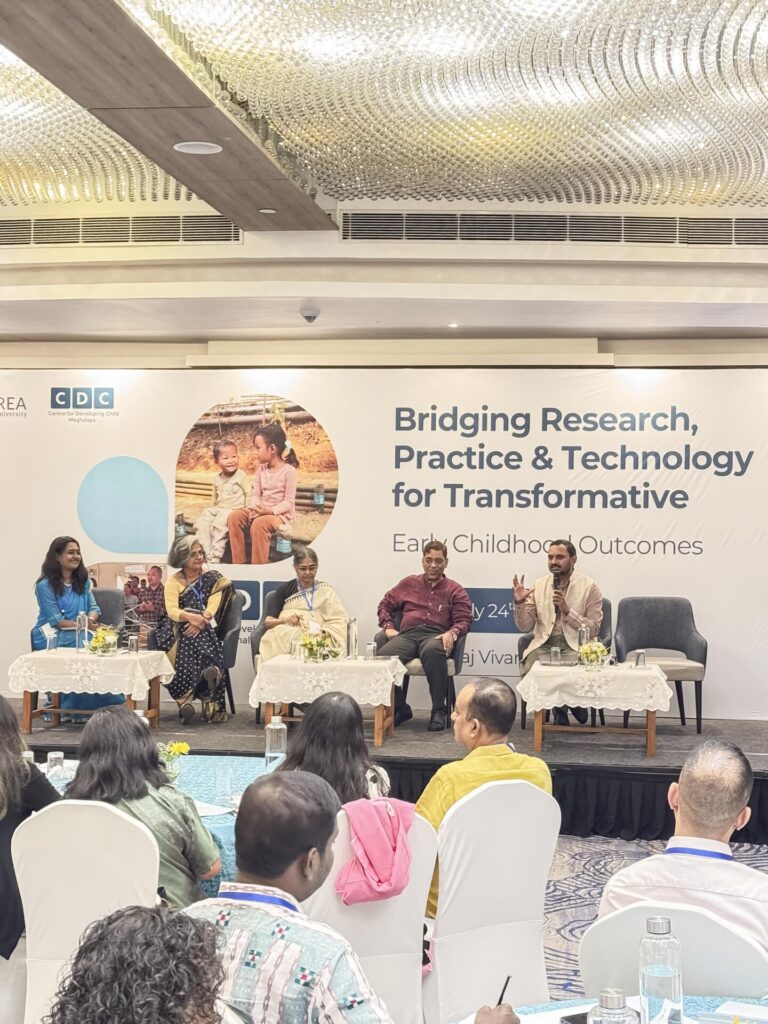
Reimagining ECD Through Innovation & Evidence
The second panel, moderated by Dr. Madhavilata Maganti, Krea University, tackled systemic issues in ECCE (Early Childhood Care & Education). Panelists discussed innovative strategies such as co-locating Anganwadi Centres with primary schools, unburdening Anganwadi Workers (AWWs) from non-core tasks, peer-assisted training, and mentoring models.
Prof. R. Subrahmaniam (CRISP) and Prof. Venita Kaul (Ambedkar University) stressed the importance of an integrated curriculum and decentralization for effective policy implementation. Mr. Prakash Paul (Van Leer Foundation) advocated for designing child-friendly, climate-resilient spaces and promoting active father engagement in parenting.

In the afternoon, participants engaged in group workshops across four thematic areas, focusing on community-led ECD initiatives, continuity of learning from Anganwadis to schools, enabling responsive caregiving environments, and leveraging technology for ECD interventions.
Team 1, led by Kong Memorial Kharmalki (MSRLS), explored how SHGs, Village Health Councils, and faith-based platforms can mobilize fathers and redefine caregiving as a shared family responsibility. Team 2 focused on institutionalizing capacity building for AWWs and primary school teachers, while Team 3 and Team 4 proposed solutions for improving Anganwadi infrastructure, fostering community ownership, and integrating ECD practices with climate resilience strategies.
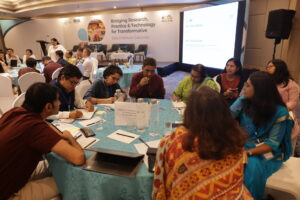
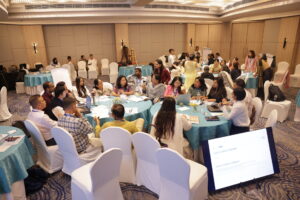
Concluding the workshop, Mr. Sampath Kumar emphasized Meghalaya’s vision of developing a scalable, human-centered ECD model through collaborative governance. He highlighted innovative initiatives like the ECD Graduate Fellowship, which aims to recruit and train rural youth to support Anganwadi services, unburden frontline workers, and foster employable skills.